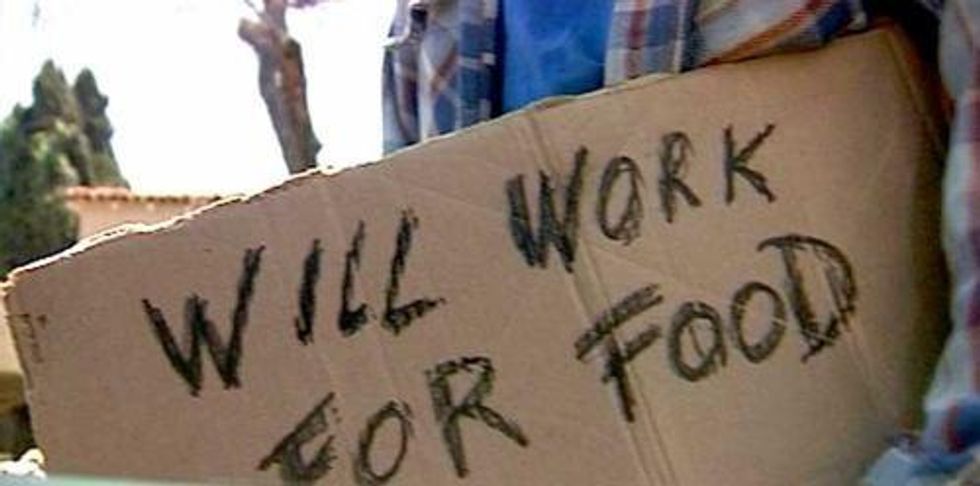GOP Pushes to Axe Food Stamps Amid Reports of Devastating Poverty
House Republicans call for cuts as studies show that five years since financial collapse, poverty and hunger remain high

House Republicans, led by House Majority Leader Eric Cantor, are proposing a 5.2 percent reduction in the budget for the Supplemental Nutritional Assistance Program that provides food stamps and other vital aid. They are also calling for more stringent eligibility requirements that would cut off an estimated 10 percent of recipients from benefits.
Debate over the future of food stamps has come to dominate the looming vote over the new farm bill, where severe cuts are being proposed by the House GOP. While proposed cuts have narrow chances of passing, they are likely to influence the debate on food aid programs and could lead to House-Senate negotiations on the farm bill, Reuters reports.
Republican leaders appear unswayed in their efforts to axe food aid programs despite new alarming reports that five years after financial collapse, poverty is stuck at high levels.
As Common Dreams reported Tuesday, a new report from the U.S. Census Bureau shows no significant improvements in poverty rates. In 2012, a staggering 46.5 million people lived in, or near, poverty, and 48 million had no health care coverage. This poverty is born unequally across genders: 2012 saw a higher poverty rate for adult women than adult men.
A recent study by University of California researchers shows that 95 percent of all income gains have gone to the top one percent since the so-called "recovery" began in 2009.
Meanwhile, a new report by the U.S. Department of Agriculture reveals that food insecurity in the United States remains at record levels for the 5th year in a row, with 17.6 million households having difficulty feeding their families and 7 million households suffering from "very low food security" that forced them to go hungry in 2012.
Critics charge that given devastating poverty rates, now is the time to bolster--not cut--vital aid. Legal Momentum President Elizabeth Grayer declares, "The data indicate a high poverty rate and a continuing gender poverty gap in the United States -- facts that underscore the need for a social safety net that is accessible and adequate."
_____________________
An Urgent Message From Our Co-Founder
Dear Common Dreams reader, The U.S. is on a fast track to authoritarianism like nothing I've ever seen. Meanwhile, corporate news outlets are utterly capitulating to Trump, twisting their coverage to avoid drawing his ire while lining up to stuff cash in his pockets. That's why I believe that Common Dreams is doing the best and most consequential reporting that we've ever done. Our small but mighty team is a progressive reporting powerhouse, covering the news every day that the corporate media never will. Our mission has always been simple: To inform. To inspire. And to ignite change for the common good. Now here's the key piece that I want all our readers to understand: None of this would be possible without your financial support. That's not just some fundraising cliche. It's the absolute and literal truth. We don't accept corporate advertising and never will. We don't have a paywall because we don't think people should be blocked from critical news based on their ability to pay. Everything we do is funded by the donations of readers like you. Will you donate now to help power the nonprofit, independent reporting of Common Dreams? Thank you for being a vital member of our community. Together, we can keep independent journalism alive when it’s needed most. - Craig Brown, Co-founder |

House Republicans, led by House Majority Leader Eric Cantor, are proposing a 5.2 percent reduction in the budget for the Supplemental Nutritional Assistance Program that provides food stamps and other vital aid. They are also calling for more stringent eligibility requirements that would cut off an estimated 10 percent of recipients from benefits.
Debate over the future of food stamps has come to dominate the looming vote over the new farm bill, where severe cuts are being proposed by the House GOP. While proposed cuts have narrow chances of passing, they are likely to influence the debate on food aid programs and could lead to House-Senate negotiations on the farm bill, Reuters reports.
Republican leaders appear unswayed in their efforts to axe food aid programs despite new alarming reports that five years after financial collapse, poverty is stuck at high levels.
As Common Dreams reported Tuesday, a new report from the U.S. Census Bureau shows no significant improvements in poverty rates. In 2012, a staggering 46.5 million people lived in, or near, poverty, and 48 million had no health care coverage. This poverty is born unequally across genders: 2012 saw a higher poverty rate for adult women than adult men.
A recent study by University of California researchers shows that 95 percent of all income gains have gone to the top one percent since the so-called "recovery" began in 2009.
Meanwhile, a new report by the U.S. Department of Agriculture reveals that food insecurity in the United States remains at record levels for the 5th year in a row, with 17.6 million households having difficulty feeding their families and 7 million households suffering from "very low food security" that forced them to go hungry in 2012.
Critics charge that given devastating poverty rates, now is the time to bolster--not cut--vital aid. Legal Momentum President Elizabeth Grayer declares, "The data indicate a high poverty rate and a continuing gender poverty gap in the United States -- facts that underscore the need for a social safety net that is accessible and adequate."
_____________________

House Republicans, led by House Majority Leader Eric Cantor, are proposing a 5.2 percent reduction in the budget for the Supplemental Nutritional Assistance Program that provides food stamps and other vital aid. They are also calling for more stringent eligibility requirements that would cut off an estimated 10 percent of recipients from benefits.
Debate over the future of food stamps has come to dominate the looming vote over the new farm bill, where severe cuts are being proposed by the House GOP. While proposed cuts have narrow chances of passing, they are likely to influence the debate on food aid programs and could lead to House-Senate negotiations on the farm bill, Reuters reports.
Republican leaders appear unswayed in their efforts to axe food aid programs despite new alarming reports that five years after financial collapse, poverty is stuck at high levels.
As Common Dreams reported Tuesday, a new report from the U.S. Census Bureau shows no significant improvements in poverty rates. In 2012, a staggering 46.5 million people lived in, or near, poverty, and 48 million had no health care coverage. This poverty is born unequally across genders: 2012 saw a higher poverty rate for adult women than adult men.
A recent study by University of California researchers shows that 95 percent of all income gains have gone to the top one percent since the so-called "recovery" began in 2009.
Meanwhile, a new report by the U.S. Department of Agriculture reveals that food insecurity in the United States remains at record levels for the 5th year in a row, with 17.6 million households having difficulty feeding their families and 7 million households suffering from "very low food security" that forced them to go hungry in 2012.
Critics charge that given devastating poverty rates, now is the time to bolster--not cut--vital aid. Legal Momentum President Elizabeth Grayer declares, "The data indicate a high poverty rate and a continuing gender poverty gap in the United States -- facts that underscore the need for a social safety net that is accessible and adequate."
_____________________

